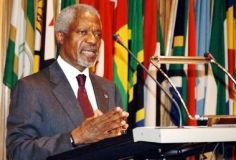Annan outlines six options on Ethiopia-Eritrea border
Jan 3, 2005 (UNITED NATIONS) — UN chief Kofi Annan on Tuesday presented the Security Council with six options ranging from maintaining the status quo to a full withdrawal for the UN mission monitoring the tense Ethiopia-Eritrea border.
 In a report to the 15-member council on the activities of the UN Mission in Ethiopia and Eritrea (UNMEE), Annan made it clear that none of the options was perfect and said that both Addis Ababa and Asmara would still have to fully implement council resolution 1640.
In a report to the 15-member council on the activities of the UN Mission in Ethiopia and Eritrea (UNMEE), Annan made it clear that none of the options was perfect and said that both Addis Ababa and Asmara would still have to fully implement council resolution 1640.
That resolution passed in November had given the arch-rival Horn of Africa neighbors until December 23 to reduce troop levels in the volatile border area under the threat of sanctions, warned Eritrea that it would face punitive measures if it did not lift the restrictions on the 3,3837-strong UNMEE and urged Ethiopia to accept the new boundary.
Annan said the first option would be maintaining UNMEE in its present configuration inside the Temporary Security Zone (TSZ), which runs along the 1,000-kilometre (625-mile) border between the two rival neighbors.
“Though reduced, this presence could buy time for diplomatic initiatives to unblock the current dangerous stalemate,” the UN chief said.
But it also warned that doing so “may set an undesirable precedent and could lead to more unjustifiable restrictions.”
A second option would involve relocating the entire UNMEE headquarters and units integral to it from Asmara to Addis Ababa, leaving only a small liaison office in the Eritrean capital.
Under this scenario, some of the UNMEE military units currently based in Asmara would be relocated to the adjacent areas south of the current TSZ. But UN troops stationed in the zone would remain in place, subject to Eritrea’s cooperation.
A third option would transform UNMEE into an observer mission, either on both sides of the TSZ or exclusively on the Ethiopian side.
The fourth would involve deploying a preventive force in strength exclusively south of the TSZ currently held by Ethiopia.
The fifth option would see UNMEE downgraded to a liaison mission keeping a small office in each capital, while efforts continued toward a political solution in line with the 2000 Algiers accord that required both countries to accept a new border demarcation drawn up by an international panel.
The panel’s 2002 decision awarded the flashpoint town of Badme to Eritrea.
The ruling has never been fully accepted by Ethiopia which says it wants the border adjusted to avoid splitting up families.
A sixth option suggested by Annan would be the full withdrawal of UNMEE and having the UN provide political support to the peace process from outside the region.
“None of of these options is perfect,” the UN chief said.
Annan also suggested that the council set deadlines for compliance with its previous resolutions on the issue.
And he warned that unless Eritrea’s restrictions on UNMEE movements, including a ban on helicopter flights, were lifted rapidly, “I would be obliged to make recommendations to the council concerning force deployment on the ground by the end of January 2006.”
Annan’s report was released amid a continuing stalemate in the Horn of Africa border dispute after UNMEE last month completed the withdrawal of its North American and European UN peacekeepers from Eritrea, meeting a deadline set by Asmara for their expulsions.
Some 180 US, Canadian, European and Russian staff affected by the order, plus some additional personnel of other nationalities, left Eritrea amid fears of renewed fighting between the neighbors.
The United Nations last month reported that Ethiopia had complied with the demand that its troops withdraw from the border area.
The two east African neighbors fought a bloody 1998-2000 war over the border that claimed some 80,000 lives.
(AFP/ST)
